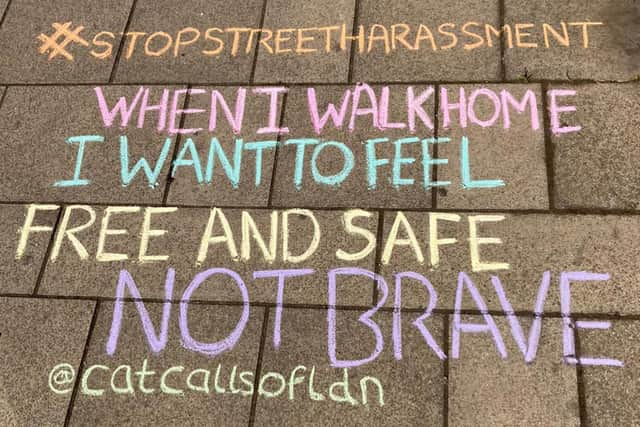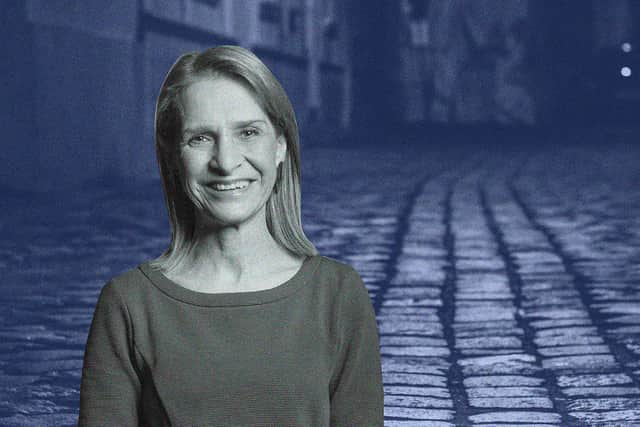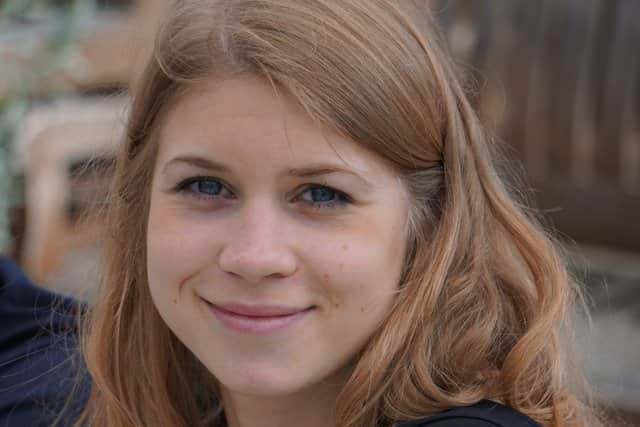Catcalling campaigner records 18,000 reports of misogynistic slurs against women and girls in five years
This article contains affiliate links. We may earn a small commission on items purchased through this article, but that does not affect our editorial judgement.
and live on Freeview channel 276
More data is needed to capture the real problem of misogyny in society, a leading anti-harassment group has said, with it counting more than 18,000 incidents of catcalling since 2017.
Farah Benis has been running the Catcalls of London campaign group for five years.
Advertisement
Hide AdAdvertisement
Hide AdShe told NationalWorld about 12,000 of the reports received were from girls under 18 who had been the target of sexually motivated slurs.
The project sees her and campaigners chalk men’s sexist remarks on the capital’s streets where incidents of street harassment have taken place.
Since 2017, she says the account has received more than 18,000 anonymous submissions of women claiming to have been catcalled by men in public.


What is catcalling?
Catcalling is the act of someone shouting degrading, sexual slurs or threatening comments at someone publicly.
Advertisement
Hide AdAdvertisement
Hide AdCurrently, catcalling offences are recorded as either harassment or public order crimes, depending on the nature of the incident.
This means there is no easy access to records specifically for each catcalling offence - making it hard to pinpoint misogynistic motivated incidents.
So, nationally, it’s hard to build a picture of the scale of the problem.
Many victims ‘still wearing their school uniform’
One 14-year-old even told Farah that she was called a ‘slag’ for not giving her number to a stranger.
Advertisement
Hide AdAdvertisement
Hide AdShe said: “A recurring theme I found from those (12,000) underage submissions was that around 63% of the individuals reporting were wearing a school uniform - and 99% of the perpetrators in those cases were adult men.”
It comes as the government has now overturned proposals to make misogyny a hate crime.
MPs voted 314 to 190, majority 124, to remove a Lords amendment from the Police, Crime, Sentencing and Courts Bill on 28 February.


Liberal Democrat justice spokeswoman Wera Hobhouse said in a statement outside the Commons: “By voting against making misogyny a hate crime, the Conservatives are turning a blind eye to the hatred that fuels violence against women.”
Advertisement
Hide AdAdvertisement
Hide AdPolicing minister Kit Malthouse said there is now an obligation on the government to bring forward alternatives that will do something positive for women’s safety.
He indicated it included examining how to deal with public sexual harassment, including whether or not to create a new offence or amend existing law, and reviewing the impact of police recording data on crimes motivated by sex or gender.
Data is needed to capture true scale of sexism in society
Farah said it’s about time there was proper data surrounding hateful incidents of misogyny to identify the scale of the problem against women and girls in society.
She said: “Ultimately, data is powerful. Reporting that shows crimes are committed under the categorisation of misogyny will really help to underline that we’re not hysterical women claiming victimhood.
Advertisement
Hide AdAdvertisement
Hide Ad“There is a serious issue in our society and it allows men to continue perpetrating crimes against women unchecked but I also believe it can’t happen in a vacuum.
“I believe education is key in creating change. We have serious institutional issues that aren’t going to go away overnight so a focus on education lays the foundation for really long term, impactful change.”
‘Street harassment is dismissed’
Farah set up Catcalls of London off the back of her own experience of being harassed by men in the street.
She added: “Street harassment is something that can be dismissed - it’s not a big deal, that’s the attitude.
Advertisement
Hide AdAdvertisement
Hide Ad“I’ve had a lot of young people who have told me they do report it to people in their lives and the onus gets put onto them rather than the perpetrators.
“Public sexual harassment can affect our sense of self-worth, contributes to fear of traveling alone in public spaces, and leaves us constantly second guessing our choices and decisions.”


It comes one year since Sarah Everard was killed by serving police officer Wayne Couzens.
Following her murder, it prompted a surge of women talking about their experiences of walking alone, being catcalled and feeling unsafe.
Advertisement
Hide AdAdvertisement
Hide AdFarah said she thinks attitudes towards women are slowly changing since the 33-year-old’s death.
“One thing we really try to focus on is men trying to take responsibility and holding their peers to account. So, don’t enable this kind of behaviour, actively call people out and help when you see these things happening and really consider your own behaviour and the impact that this can have on women.
“I definitley think we are seeing a change in this post Sarah Everard and Me Too time.”
A message from the editor:
Thank you for reading. NationalWorld is a new national news brand, produced by a team of journalists, editors, video producers and designers who live and work across the UK. Find out more about who’s who in the team, and our editorial values. We want to start a community among our readers, so please follow us on Facebook, Twitter and Instagram, and keep the conversation going. You can also sign up to our newsletters and get a curated selection of our best reads to your inbox every day.
Comment Guidelines
National World encourages reader discussion on our stories. User feedback, insights and back-and-forth exchanges add a rich layer of context to reporting. Please review our Community Guidelines before commenting.
